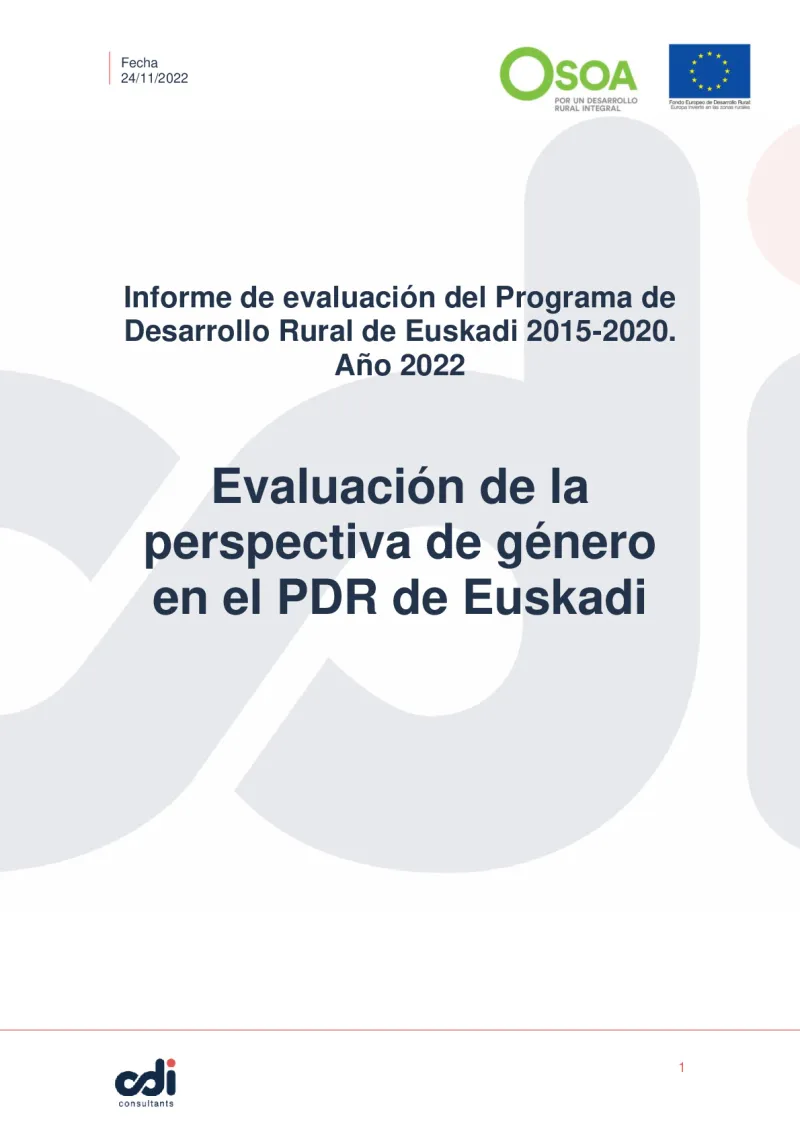Evaluation of the gender perspective in the Basque Country
The report aims to assess gender inequalities and how a gender perspective can be incorporated into the Rural Development Programme of the Basque Country, Spain.
- Spain
- 2014-2022
- Cross-cutting impacts


This evaluation of the gender perspective in the 2015-2020 Rural Development Programme (RDP) of the Basque Country was published in 2022.
The evaluation includes the first results on this topic, which will culminate with the ex post evaluation to detect the degree of achievement of respective RDP objectives.
The main objectives of the evaluation are: 1) to analyse the momentum that was given to gender equality in the framework of rural development policy of the Basque Country; 2) to analyse the measures taken to promote equality between men and women and the integration of a gender perspective in the design of the RDP and its monitoring and evaluation systems; 3) to assess the impact of actions carried out within the RDP framework on the promotion of gender equality; and 4) to generate information of interest that facilitates decision making for the Basque Government's Department of Economic Development, Sustainability and Environment in the implementation and improvement of the RDP in terms of gender.
The methodology for the development of the evaluation has been based on guidance provided by the European Commission in the 'Practical Guide to the Design and Conduct of Public Policy Assessments: The AEVAL approach' and the guidelines recommended by the Commission through the European Evaluation Helpdesk for Rural Development. However, it was necessary to adapt these methodological guidelines to the specific characteristics of this analysis.
The evaluation questions are: a) how has the objective of promoting equality and non-discrimination been taken into account in the design and implementation of the programme?; b) and in the monitoring and evaluation phase of the RDP?; and C) what impact are the actions carried out under the RDP considered to have in achieving this objective?
The main conclusions of the evaluation are described below.
It is considered important to monitor and evaluate the application of gender equality within the framework of the RDP and to continue to evaluate the topic.
After analysing the situation of the rural area in the Basque Country there is still inequality between women and men, although the data are increasingly favourable.
The public participation process carried out in the programming phase of the RDP involved the department's equality unit as an advisor in the promotion of the principle of equality between men and women and non-discrimination, and the associations involved. These stakeholders also participated in the Monitoring Committee.
The needs analysis presented for the programming of the RDP includes analyses and data disaggregated by sex (e.g. activity rates, unemployment, and employment in the agricultural and food sectors, among others). However, key aspects are missing, such as the situation of young women, which is key in rural areas, and their level of entrepreneurship. It is also perceived that the results of the analyses are not reflected in the SWOT matrix.
Certain measures of the Basque RDP include positive actions towards women for their access to aid. In these cases, the criteria for the selection of operations prioritise and promote non-discrimination and equal opportunities between men and women, in the sense that they prioritise women farmers as participating groups, the incorporation of young people and/or women, and the fact that the owner is a woman farmer or the creation of new companies promoted by women, etc. However, not all measures have prioritisation measures based on gender factors.
In terms of the management and monitoring system, the vast majority of RDP measures (75%) collect data in the system disaggregated by sex for individuals.
Female participation in the RDP continues to be low. Of all the applications submitted for the different measures of the RDP, and for which information disaggregated by sex is available, 33.13% were made by women. Only in the case of LEADER is the participation rate more equal (56.84% men and 43.16% women). As for the grants awarded, 65.86% are to men and 34.14% are to women. All measures show higher values for men than women, except for Measure 1.3.
Furthermore, when the managing bodies were asked about their perception of whether the RDP measures positively promote equal opportunities, the average answer was that they do not believe there is effective promotion of equality.
Author(s)
CDI Consultants